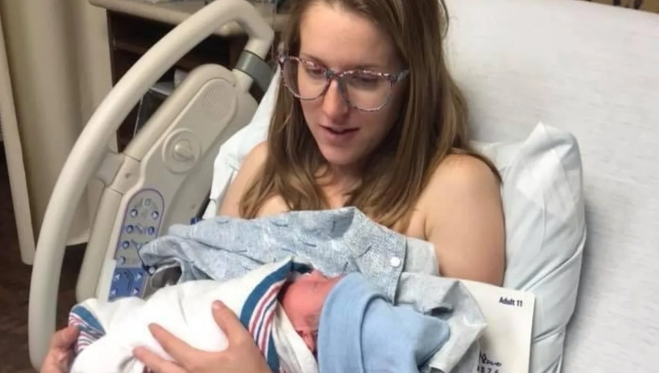I was as prepared as I could be for my body to run the marathon that is childbirth, yet it turned out to be more like a sprint.
You see, I gave birth in a car—and I felt invincible.
During pregnancy, I chose to create a positive experience. I sought all the research I could. I watched birth videos and documentaries, read birth stories, learned about the stages of labor, recorded coping techniques, drank red raspberry leaf tea, and ate all the dates. I sought care, prepared my cookies and teas, gathered breastfeeding cream, a pump, and belly bind. I folded baby’s diapers and clothes, praying for those important first weeks.
Perhaps the most important thing I did was to join a due date group with like-minded mamas to learn and grow with, and to share all the information, research and tips we could.
Much of my preparation was mental and spiritual prep-work. I read tons of books about birth, including faith-based books about labor, a practical guide to an “emergency” birth, and a natural pregnancy and childbirth guidebook. (And yes, I did end up using knowledge of each of these resources!)
Each of my two births were very different. With my first child’s birth, I did not know much about birth or my options. My water broke at the onset of labor and I labored grudgingly in the one hour car ride to the hospital. Once there, I begged for an epidural.
This time around, though, I approached labor differently.
I chose to experience unmedicated labor, even though it isn’t an easily understood decision. There were so many unsolicited opinions from people about what I should do with my body, and it was hard to not feel bombarded with all of the negative talk surrounding birth. But by having the support of the due date group and learning the wisdom that has been passed down in generations about childbirth, I wasn’t deterred in my decision.
I knew that I needed to focus on not being overtaken by the potential overwhelm of birth. I remembered that I had a right to informed consent and that I could find kind of positive help I needed to give birth the way I knew I needed to. I chose to memorize biblical and positive affirmations to recite during birth to help calm myself through the contractions, and focus on what’s at hand, rather than panic.
Labor began
The day my son came, I woke up before the sun at 4am and headed for the bathroom. I felt nauseous and achy like I was going to throw up and have diarrhea all at once. It was a very distinct, disgusting feeling throughout my body. Yet even with that feeling, I was in denial that labor was really starting.
My water was intact, and I was expecting my water to break at the onset of labor, as it did with my first. I was having some contractions, although extremely erratic. They were not consistent with clockwork, but they didn’t stop, either. I would have a contraction that lasted five seconds, then a break for 20 minutes. Another contraction, this time for 20 seconds, and a break for seven minutes. I tried using an app to track and time the contractions for a bit, but ultimately that proved to cause more anxiety than peace.
So I turned the app off, and focused on being present. I was so calm. I let the contractions come and go. My family didn’t even know I was in labor until they woke up with the sunrise! (I didn’t want to wake everyone up—silly me, being in active labor!)
I was grateful to labor on my own in a quiet house in the early pre-dawn hours before the house and outside world woke up. I kept my composure, breathed through contractions, read and prayed, and let the birth process happen on its own.
When the contractions did not stop, I realized this was the real thing.
Once everyone was awake, I realized that I should probably be doing more to prepare, like get to help! We haphazardly packed a bag and rushed out the door to drive an hour to the place chosen to have our baby. I was not excited for that long car ride. I remember laboring in the car before, and it was miserable for me. I also knew how quick my past labor had been, and had this deep feeling, perhaps a mother’s intuition, that we wouldn’t make it to our destination in time.
I knew that this labor was progressing very quickly, and the baby was going to be born soon. Yet we went.
Giving birth in the car
My family got into the car and we drove, planning to meet more family at the hospital to take over the care of our toddler for a few days.
I labored in the car for 40 minutes until the ring of fire came. I knew what this meant: He was crowning, and we had to park. I tried to get into the best squat position I could, facing the seat, relieved that the car had stopped at this point. I repeated my affirmations over and over, and tried to focus on staying as calm as possible.
And he was born in the car, in the back of a small town grocery parking lot.
My baby was 6 pounds and 6 ounces, born at 9:15 in the morning, as I was facing the seat backward and squatting in the passenger seat of the car.
I didn’t really push. A combination of by body’s contractions and gravity seemed to do all the work. I was squatting upright, and the baby to just sort of plopped out. Head first into the car seat, with my hand to guide his head down, and a bit of the cord and fluids followed.
I attempted to squat fairly awkwardly in the seat to hold my fresh son and rub the vernix into his sweet skin. We were in love, and I felt invincible. I immediately felt relief of all the pain and tension. The rush of oxytocin and hormones from birth made me feel on top of the world. (In that moment, I almost forgot that my toddler was in the backseat watching, eyes wide open—he was so quiet!)
The ambulance was called, we were checked out, and all was well. I waddled to the ambulance while the EMTs held towels around me and baby. They needed to take me to the hospital to make sure we were okay. I sat in the back of the ambulance stroking my baby, relieved to have more space to stretch out.
At the hospital, we sat in a room for a while until they figured out what to do with us, since the baby was already here. We stayed overnight and I reflected on the birth as I could.
Reflecting on my car birth
In some ways, I was sad. This is not what I wanted first moments with my son to be like. Although I was prepared for birth and felt incredible afterward, I felt sort of exposed to the world during the process. My body was depleted—and ultimately, my baby was born in the car (not exactly something that was on my bucket list).
I felt grief for the way (or rather, place) that my labor happened. But I was also thankful for a powerful, unmedicated birth. I grieved the loss of expectations, while being thankful for the reality. And that’s okay.
I did it. We did it. This birth was a sprint, not the marathon so many women talk about.
Nothing about my labor and contractions were predictable. I did not have much knowledge about birth before I was pregnant, but the preparation during my pregnancy helped me feel more at ease. Despite the situation, I didn’t feel that it was challenging. I felt able, or at least as able or prepared as any mother can be, for labor.
The feeling of being in labor is indescribable—the juxtaposition between pregnancy and postpartum, the time in labor where you are in the hyphen of here and there, a time that forever changes your life and family.
It was truly vulnerable and powerful—an unusual presence of two feelings that left me over-the-moon. As soon as my son was born, the feeling of pain was gone, just like that. And in its place was exhilaration; a rush of adrenaline and awe. I did it completely on my own, in the front passenger seat of the car!
Our bodies are absolute miracles. I grew into a mother of two that day, and with that, my new mission was born: to help other mothers learn and experience the feeling of being empowered by your birth and labor, not in fear of it. I decided to become a birth and postpartum doula, to empower, coach and be alongside other mothers in their own journey in birth and motherhood.


